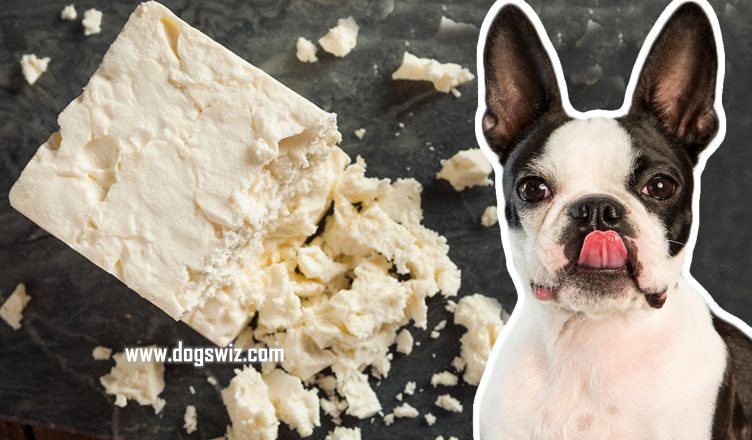This is a question that many dog parents wrestle with. A lot of people have been under the impression that it’s safe to feed their dog feta cheese, but is this actually true? Is feta actually good for dogs? This article will answer all of your feta cheese questions, as well as provide information on which cheese is better for your pooch and which is not.
“Can dogs eat feta cheese?” In short, the answer is no! Feta cheese is made from sheep and goat’s milk and sometimes these products contain a variety of allergens that can’t be processed. Most people mistakenly believe that giving their pet feta cheese will provide them with the same nutrients and flavor as humans. This, however, is not the case! Feta cheese has a greater lactose, fat, and sodium content, all of which can negatively impact a dog’s health at any time. Feta cheese isn’t toxic, but it’s a wise idea to keep it away from your cuddle buddy. If you’re wondering whether you may offer feta cheese to your pup, it’s necessary to first understand why this cheese is regarded as harmful for dogs.
What Makes Feta Cheese Harmful To Dogs?
Here’s what makes feta cheese is harmful to dogs:
1. Lactose:
Lactose is a sugar that can only be found in milk. It can also be found in dairy and milk-based goods, such as cheese and ice cream. According to Monash University, feta cheese contains 0.13gram of lactose per serve which is usually high. Despite the fact that feta cheese contains less lactose than most other cheeses, it is still heavy and dangerous for dogs. The other thing is many dogs have lactose intolerance.
Lactose intolerance is the condition in which a body isn’t able to digest lactose content found in milk and dairy. When puppies are fed their mother’s milk, their bodies create enough lactase enzymes to keep them alive. When they reach adulthood and are no longer receiving their mother’s milk, their enzyme level rapidly drops, making it harder for their systems to accept dairy products.
If your furry friend is lactose intolerant having feta cheese and other dairy products which can cause the following problems:
- Diarrhea
- Vomiting
- Bloating
- Constipation
- Nausea
- Cramps
2. Fat content:
Feta cheese is very high in fat content. Dogs should never be given excessive amounts of fat. Fat should make up no more than 10-15% of their diet. Fatty acids will not only make your dog obese, which is a concern in and of itself, but it will also raise your dog’s risk of pancreatitis and cardiac problems.
3. Sodium Content:
High sodium content is present in feta cheese. Vomiting, diarrhea, high temperatures, tremors, depression, seizure, and death are all symptoms of too much sodium. A typical side effect is sodium ion poisoning.
What To Do If My Dog Ate Feta Cheese?
When you return to your room, you find your dog nibbling feta cheese. First off, don’t panic and find out what quantity they ate and take necessary measures cautiously. If your dog ate a small piece or crumbles of feta cheese the odds are they will be just fine. If they are lactose intolerant, wait and look out for the above-mentioned symptoms like diarrhea, vomiting. If you observe any of the symptoms, take your dog to the veterinarian right once to ensure there are no long-term consequences. You might expect your dog to have a dry mouth after eating cheese, so make sure you give them lots of water.
Other Types Of Cheese To Look Out For
There is ongoing confusion among pet owners about which cheese is good and which is bad for pets’ intake. So here are some cheeses that you should avoid in giving your pet:
1. Blue cheese: The toxin roquefortine is produced by blue cheese. It’s a fatal substance that can kill dogs.
2. Goat cheese: Goat cheese fall in the same category as feta cheese.
3. Flavored cheese: Flavored cheese contains toxins that can affect a pup’s health severely. Some cheese contains onions, avocadoes, garlic, and other potentially toxic ingredients. Others might contain preservatives and artificial additives that can hurt your dog.
Conclusion
So, Can dogs eat feta cheese? The answer is no. Even though feta cheese isn’t toxic you should avoid giving it to your pet. Avoiding high fat, high sodium, lactose food can go a long way.
Keep in mind, you should always consult your veterinarian before giving cheese, or any human food to your dog.
Thank you for reading the article.
Here are some other cheese-related dog articles that you might be interested in.
Has your dog ever eaten feta cheese? What was their reaction like? If you have any experience with dogs eating feta cheese, please share it in the comments section below.
